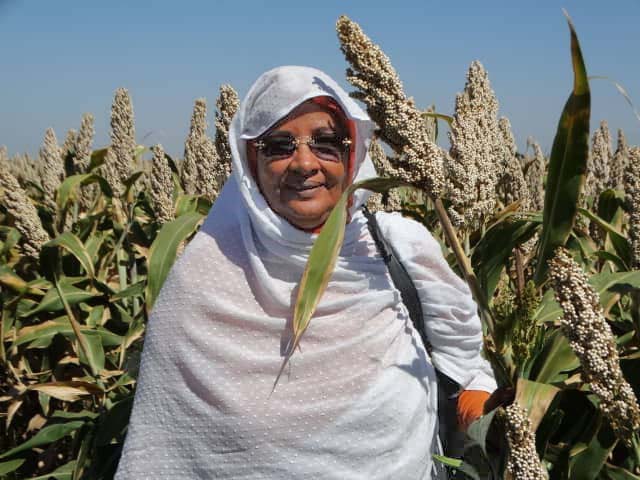‘Fuel shortage threatens sorghum harvest in Sudan’s White Nile state’

Samha Abdelmokaram, former director of the White Nile Ministry of Agriculture, pictured in a sorghum field (Photo: Supplied)
The vital sorghum harvest in White Nile state is under threat as farmers struggle to afford fuel, which is increasingly scarce as a result of the ongoing war in Sudan, and has forced prices to skyrocket more than threefold. At a time when farmers should be harvesting their summer crops, and preparing their farms for winter, more than two-thirds of arable land is reportedly lying fallow, while fuel smuggling is rife.
The farmers attribute the high costs of harvesting to the scarcity of fuel due to the sudden expansion of the war to El Gezira, which was an important logistical crossing point for fuel to White Nile state.
The price of diesel, essential for a wide range of agricultural machinery and water pumps, has increased more than threefold from SDG20,000 to SDG70,000 for a 16-litre jerrycan. However, farmers in White Nile state lament that they are not able to buy fuel needed for the upcoming sorghum harvest.
Mohamed Dawi, secretary general of the White Nile Organisation for Resource Development (NORA) told journalist Elnoor Abdallah that “in fact all agricultural projects in White Nile state should now be harvesting sorghum from the summer season and preparing their farms for the winter season.
“The farmers here now have difficulty in obtaining fuel, especially after diesel recorded an unprecedented rise in prices due to this absurd war.”
Samha Abdelmokaram, former director of the White Nile Ministry of Agriculture and chairperson of NORA said that “only 40,000 feddan have been cultivated this winter season. This is less than a third of the area of 100,000 feddan that was previously cultivated, which would have increased to 120,000 feddan with sufficient inputs.
“Sorghum is a strategic crop in addition to vegetables, which are in the process of bearing fruit. These crops do not tolerate any fuel delay,” she said.
“The 3,000 gallons of fuel that recently arrived in the state, are not enough to meet consumption in a town the size of Kosti or Rabak, so nothing is left for the for irrigation pumps.”
The farmers have spoken with White Nile state Governor Omar El Khalifa, and discussed their problems, as well as the smuggling and theft of fuel, “which is one of the biggest problems”.
According to White Nile TV Canal 24, the governor has appealed to the federal High Committee for Securing Commodities to provide more fuel to ensure the continuation of emergency services and the success of the agricultural winter season.
Food crisis
Sudan topped this year’s International Rescue Committee (IRC) watchlist of countries most likely to experience a deteriorating humanitarian crisis. Sudan faces extreme levels of food insecurity, with 17.7 million people – 37 per cent of the population – experiencing crisis hunger levels (IPC 3) or worse. The IRC) has warned that “at crisis levels of food insecurity, families adopt negative coping strategies, like selling their possessions or marrying off their children, to secure enough food to meet their basic needs. At more extreme levels of food insecurity, hunger and starvation are a daily occurrence”.
The UN World Health Organisation warned that month that nearly 18 million people across Sudan are facing acute hunger – more than double the number at the same time a year ago.











 and then
and then